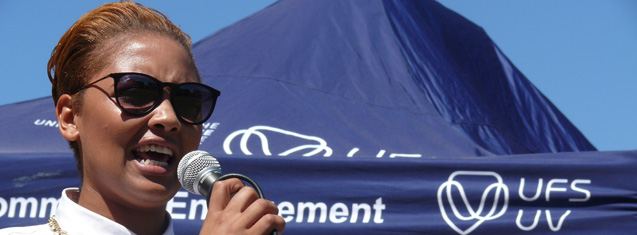Latest News Archive
Please select Category, Year, and then Month to display items
12 January 2024
|
Story Nonsindiswe Qwabe
|
Photo Sonia Small
 Since joining the UFS in 2008, Dr Grey Magaiza has worked extensively on approaches that can foster the socio-economic transformation of societies.
Since joining the UFS in 2008, Dr Grey Magaiza has worked extensively on approaches that can foster the socio-economic transformation of societies.
“The future should be one where communities can decide on their development agenda and futures. That’s the most important for me.” Dr Grey Magaiza, Deputy Director of the Centre for Gender and Africa Studies (CGAS) and Head of the Community Development programme on the Qwaqwa Campus, is passionate about capacitating communities to be agents of change and advancement. His vision for the future emphasises the empowerment of communities to take charge of their development by actively participating in decision making and the implementation of development projects that can improve their lives.
Since joining the UFS in 2008, Dr Magaiza has worked extensively on approaches that can foster the socio-economic transformation of societies. Over the years, he has crafted his research speciality into one that he is most proud of – being an interdisciplinary scientist immersed in the development of communities.
“I’m in a fortunate position of researching what I like. I say ‘fortunate’, because I’ve taken the time to understand what I’m passionate about, which is the overall field of rural livelihoods and livelihood futures – in short, community development. My research starts from an engaged university, understanding the elements that a university must use to enhance transformation and relevance to its immediate community in terms of development.”
One of the ways he has done this is by looking at social entrepreneurship as a development approach for young people in a rural setting. Through workshops with non-profit and civic organisations in Qwaqwa, Dr Magaiza has been helping these organisations to map out their needs and actively meet them through the involvement and support of external role players.
“We understand that communities are part of the national development agenda, but even that national agenda respects community knowledge and intentions and allows communities to shape their identity. A critical enabler of this is community organising. You bring back the capacity in communities to have dialogues on issues affecting them as spaces for engagement, knowledge exchange, and for people to just talk about their way forward.”
By enabling communities to define their development agenda, they can address their specific needs, challenges, and aspirations, he said. “When I look at livelihood futures, it’s quite an exciting aspect of my work – it’s like looking into a fortune tellers’ globe, because you’re not deciding for communities what they should do, but the communities themselves take those decisions.”
TV star calls for dialogue on gender empowerment
2014-04-01

Jo-Anne Reyneke giving students and staff a talk from the heart.
TV star Jo-Anne Reyneke – previously known as 'Pearl' in Muvhango (SABC 2) and now 'Prudence' in Rhythm City (etv) – warned Qwaqwa Campus students to be careful of the things they say. She was speaking during the recent launch of the Qwaqwa Campus Gender Forum.
“As young people, you must learn to always truly listen and understand what your friends say. You must also be careful of the things you say, as you might prevent or be the cause of your friend's suicide, if you are not careful. What might seem like a small thing might have far-reaching results for you and your friend.
“Respect those who are different from you, as all of us would like to be accepted as we are. Carry yourself in a manner that shows you love yourself – and this starts with you respecting yourself and those who are different from you,” said Reyneke.
Reyneke also acknowledged that growing up was not easy for her, since she was labelled 'a Zulu-speaking white' due to her light complexion.
“I am glad that this campus has this kind of forum which will enable all – victims and perpetrators – to come together and share their experiences. This will further promote healing, reconciliation and unity.”
The Gender Forum is tasked with encouraging dialogue on matters that concern gender sensitivity and equality. It encourages both staff and students to break their silence and to create an environment of tolerance based on respect for human dignity and inclusiveness. The forum is constituted by various stakeholders with special skills in counselling, facilitation and empowerment in general.